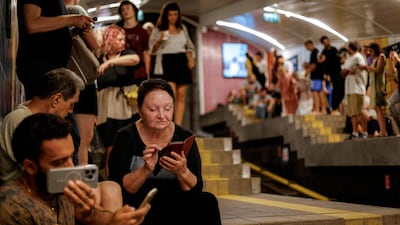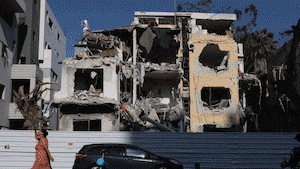Amid the deadly missile strikes exchanged between Israel and Iran in recent days, another battle is taking place involving communications, technology and the control of information that might prove decisive in the conflict.
Minutes after the first Israeli strikes last week, Iran's Ministry of Information and Communications Technology imposed "temporary" restrictions on internet access.
Officials in the country have insisted that the internet limits would be lifted when the situation returns to normal, yet that does not seem to be any time soon.

On Tuesday, Iran took measures further and banned officials from using devices connected to public networks.
WhatsApp users in Iran were also dealt a blow when Iranian media warned citizens that Israel may have compromised the app to collect intelligence.
Those concerns are not unfounded, given Mossad's role in the deadly Lebanon pager attacks that killed Hezbollah members and officials, as well as civilians.
Iran, however, is no stranger to using technology and communications in various battles.
It is the home of Mint Sandstorm, a group designated by Microsoft as a cyber crime actor that has been known to cripple computers overseas and hold valuable data in exchange for ransom.
US cyber intelligence agencies documented Iran as trying to hack the email accounts of staffers on Donald Trump's presidential campaign.
Although the widespread availability of computers and prevalence of high-speed internet connection have made technology and communications more important than ever in war, their use is hardly new.
During the Vietnam War, the US use of encrypted radio signals was thought to be a major advantage, but decades later, it was discovered that the North Vietnamese had found a way to read the signals and determine where the US was seeking to strike or to send soldiers.
"Since the advent of telecommunications in the early 20th century, there has been a leapfrogging fight between those who can jam and those who can break codes," said Frank Ledwidge, a former British military intelligence officer.
Mr Ledwidge said that vigilance and even paranoia about potentially compromised technology can be the difference between victory and defeat.
"If you use it, you will be killed, and if you don't, you may have a chance to survive provided that your circle has not been penetrated in in a similar way," he said.

Mr Ledwidge said that although Iran knows how to use technology to cause confusion, the country it appears to have little confidence in securing communication networks or encrypting content critical to national security.
"The Iranian regime in terms of response to the Israeli technological and air onslaught, they're running out of options," he said. "Israel has freedom of operation in the third dimension, so they can strike anywhere they like."
Iranians also lack basic internet access as a result of the country's increased controls.
Although Iran does not officially support other ways of connecting to the internet, such as low-earth-orbit satellite services such as Starlink, there is reason to believe that if Iranians have the proper consoles, they could circumvent internet blackouts.
"The beams are on," Elon Musk, Starlink chief and tech tycoon, posted on X in response to someone asking if the service was available in Iran.
If that is the case, then that could also be a loophole in Iran's attempt to control the flow of information that it considers to be critical to success.
Therein lies how complicated computer network and device security can be, even with all hands on deck.
"You could always have back-up communications plans," said Mr Ledwidge. "The difficulty is that they may feel that those have been compromised as well."


